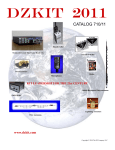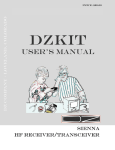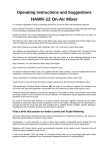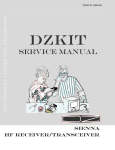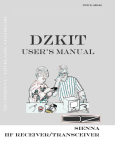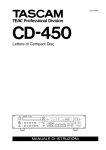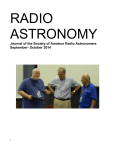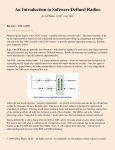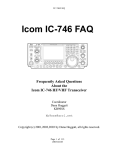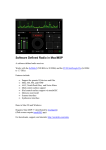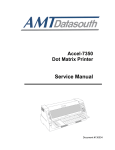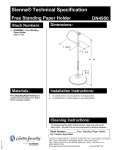Download ing, Styling and Flexibility, and now you can have
Transcript
The DZKit Sienna HF Transceiver Sets “The State-Of-The-Art” for Engineering, Styling and Flexibility, and now you can have it “your way” with many upgrade choices, starting at only $1199! Sienna’s front panel has a well-designed control layout: lighted buttons with a positive, non-squishy response; an easy to navigate menu system that uses plain language, not cryptic gobbledygook; a beautiful blue-green vacuum fluorescent display; two backlit analog meters; controls that are grouped logically for easy use; mic jack; headphone jack; separate paddles and manual key inputs. • • • • • • Dual microprocessors - one for keying and mic sampling, one for general control with web-updateable firmware Dual 10dB preamps and a 10dB aenuator Dual receive (external secondary receiver audio can be routed to one speaker, internal receiver to the other) Dual keying (manual key and paddles active simultaneously with front and back panel access) Dual audio (headphones and speakers active simultaneously with separate volume controls) Dual analog backlit meters This bottom view shows how you get access to the IF filters by removing a cover plate. In addition to non-removable AM filters at each IF, there are three IF filters at the 9MHz 2nd IF and three more at the 455kHz 3rd IF that can be snapped in as shown above. • • • • • Dual passband tuning (at 9MHz 2nd IF and 455KHz 3rd IF) Dual antenna ports (plus receive antenna input) Dual-tone multi-color front panel for easy identification of groups of controls Dual band-change modes: External keypad has direct onebuon band selection; Front panel has a ʺbandʺ buon, then use the rotary knobs to change VFO memories or bands, or use the up/down buons. Dual mic inputs— one balanced input (150-600 ohms), and one unbalanced line level input. The back panel is laid out cleanly. On the lower left is the computer control interface (RS232C) and expansion space. On the upper left are connections to the optional external keypad (compatible with the Yaesu FH-2), keyer paddles, straight key, line level audio in and out, 455kHz IF Out and receive antenna. Transmitter I/O is in the center (top-to-bottom: unbalanced mic in, PTT in, ALC in and Yaesu-compatible linear control). Main antenna jacks, ground lug and power are to the right. The 100W amplifier is protected by a 25A fuse. Sienna Specifications. Frequency range: 10 kHz to 30 MHz. (Specs valid 1.8MHz-29.7MHz) Modes: SSB, CW, AM, FM and Digital (via external PC). FM modulation: frequency modulated carrier with 2122 Hz pre-emphasis; selectable deviations of +/-2, 4 and 5kHz. FM receive IF: 455kHz, includes two 4-pole +/-10KHz ceramic filters. MDS (PSB off): -128/-133/-136dBm (preamps: off/1/both). MDS (PSB on): -132/-135/-136dBm (preamps: off/1/both). BDR: >112dB at spacings greater than 1kHz, >115dB at spacings of 5kHz and greater (preamps on). IMDDR3: >87dB regardless of spacing. Tx 2-tone IMD (ref PEP): 3rd order: -30dB @ 100W, -40dB @ 10W; 5th order: -43dB @100W, -53dB @ 10W. Noise Blanker: Variable threshold, retriggerable pulse width (4 selectable widths). Freq stability: +/-1 ppm (0-50C) after 30 minute warm-up, using included TCXO. Displayed resolution: 1 or 10 Hz (internal resolution is sub-Hz). Tuning step size: 1, 10, 100, 1k, 10k Hz. RIT, XIT range: +/-16MHz, with two speeds. Memories: 147, including 85 programmable GP memories preset to desired bandplan, one scratchpad preset to WWV, 5 VFOA memories per band, one VFOB memory, ten 12-character CW memories with selectable Farnsworth mode output. Mic input impedance: 150-600 Ohms, balanced and unbalanced. Front panel mic jack is Yaesu-compatible. CW/SSB/AM IF frequencies (Rx): 70.455 MHz, 9.0 MHz, 455 kHz. CW/SSB/AM IF Filter selection: 70.000MHz/15kHz roofing filter standard (70.455MHz/4.5kHz optional), 9.0015MHz/2.4kHz 4-pole SSB crystal filter standard, 455KHz/6kHz ceramic filter standard (can be replaced with Collins 5.8KHz filter); Choose up to three additional Inrad snapin filters for 9.000, 9.0015 or 9.00075MHz; Choose up to three additional Inrad or Collins snap-in filters for 455kHz. Broadband IF frequency output: 455kHz +/-250kHz, 50 ohms. Transmitter IF: 11.98MHz (single conversion) Transverter: Use 0-10W Tx output and Receive antenna. Display frequency shows actual frequency. 28MHz IF. Stereo audio output power: 1.5W/ch (available even while using headphones). Linear control outputs: TX Enable in, TXGND out, TTL band data, fuse-protected 12V@250mA, Yaesu band data connector pinout via 8-pin mini-DIN connector. External ALC input: 0 to -5v. DSP: auto-notch (SSB), manual notch (CW), variable bandwidth filters, NR, AGC software included with PC option. DC power requirements: 2.5A receive (11-15v), 6A transmit @10W (12-15V), 25A transmit @100W output (13.8-15V). Dimensions: 3.5"H x 14"W x 16"D (rubber screw-on feet located in a 12.25" x 14.0" area). Weight: <12 lbs fully loaded. Preassembled boards: Controller, bandpass filters. Complete kit boards: DC power distribution/tuner, RS232, IF filters, front panel. Partially preassembled kit boards: receiver, transmitter, 100W amp. Specifications subject to change without notice. Think you can’t have high performance in a kit radio? Think again! Sienna offers top-notch performance for the most demanding operators! World-class QSK! Hear between the dits at over 70 wpm. The top trace above is the RF output at the antenna jack, with Sienna sending two dits at 60 wpm. The bottom trace shows the Sidetone, and between the dits, received audio. You can see that the receiver recovery time is only 10ms. Also note the “clickless” audio (no glitches in the waveform), and the smooth rise and fall time of the RF envelope. Sienna has up to 4 selectable IF filters at the 2nd IF, and 4 more at the 3rd IF. Each IF can be “slid” back and forth against the other to effectively narrow the bandwidth. Above left, you can see the front panel display with both filters centered and the resulting spectrum plot of a signal in the passband. On the right, one filter has been slid over 200Hz, and you can see the resulting smaller bandwidth. Add DSP to your Sienna ChromaSound provides audio DSP capabilities. Available from Silicon Pixels (www.barberdsp.com) for $50. • • • • • • SSB "de-noise", for reducing static on SSB signals Automatic notch filter, for removing tones, heterodynes, and those pesky carriers Bandpass, Low-Pass, High-Pass, and Band-stop (manual notch) filters User-defined filters, using the built-in Graphical Filter Designer. Just drag your filter from the design window to an empty button! Selection of pre-defined filters, AGC, or Automatic Gain Control for operation under varying conditions Built-in serviceability makes assembly and troubleshooting easy! The DC power and tuner tray rotates up for access to the 100W amp. The 10W transmitter can be lifted out of its compartment. These are just two of the many features that make it easy to build and service your Sienna. This switch puts a 70dB attenuator in the transmit oscillator path, allowing it to be used as an S9 signal source for receiver S-meter calibration. Menu options allow you to do calibration and run tests. For example, when you turn on the first item in this menu (DspFrq = TXVFO), the transmitter’s VFO is set to the display frequency instead of its normal value. This allows you to use it as an RF signal generator to test or troubleshoot the receiver. Add a panadapter or secondary receiver to your Sienna. Made by RFSpace, the SDR-IQ is a software defined radio (SDR) receiver that connects to the 455kHz IF Output jack on Sienna’s back panel. or to a separate receive antenna. Connect the USB cable to your PC, select SIENNA from the list of supported radios, and you’ll be able to monitor up to 190kHz of spectrum around your operating frequency. As you change frequency, the SDR-IQ keeps up with you, and if you click on a signal of interest, the SDR-IQ will re-program Sienna to go to that frequency. You can view the spectrum either as a traditional spectrum analyzer, or as a horizontal or vertical “waterfall”. DZKit does not sell the SDR-IQ. It must be purchased through other retailers. It typically sells for about $500. Compartmentalized for isolation, strength and expansion Transmitter compartment Power compartment Back panel Amp compartment Auxiliary compartment Front panel/controller compartment Receiver compartment Sienna is compartmentalized. The controller/front panel, DC power conditioning, receiver, transmitter and amplifier are all in different compartments. In addition, there’s a small 4 x 6 area near the back panel called the “auxiliary compartment”. All are available for your use depending on which options you have installed. For example, if you have a receiver model, the amplifier, transmitter and auxiliary compartments are available. If you have a 10W transceiver, the amplifier and auxiliary compartments are available. If you have a 100W transceiver, the auxiliary compartment is available. If you’re an experimenter, you will find the availability of these compartments and access to spare sheet metal on the back panel very handy. We are planning some enhancements that will go on a board in the auxiliary compartment. Can you build a DZKit? Yes! The key to your success...DZKit Manuals. 1. 2. 3. Tips on kit-building. Each DZKit manual has a number of pages at the beginning that explain how to solder safely and well, how to avoid static electricity that could damage sensitive electronics, how to sort parts, and how to follow the step-by-step instructions. Detailed Parts List. Each board or chassis construction section has a list of parts along with a picture or drawing of the each part for easy identification. Simple Step-By-Step procedures. Every step has a set of parentheses next to it so that you can check off the step as you finish it. The steps are written in non-technical, everyday language so everyone can understand. 4. Detail drawings, pictorials, and color pictures are used to show exactly what 5. Exclusively with DZKit, parts bags are pre-sorted. When parts look similar, the board or chassis should look like. they are placed in different bags. Each bag contains a printout of actual part names (C12, R22, etc.) and their values. Match the part with the silkscreened text on the board and you can’t go wrong. 6. Also exclusive to DZKit, if you have access to a nearby PC while building your kit, you can bring up the board layout using free software and search for a part name. The software will show you exactly where the part goes. 7. Operating/Troubleshooting Instructions. Our more complex manuals are broken into three parts - assembly, operating and service/troubleshooting, and each of these are very detailed. 8. 9. Circuit Description, Block Diagram and Schematics. If you are technically inclined, or interested in learning about electronics, you’ll find the Theory section of the Service Manual very helpful as well as educational. Warranty. DZKit warrants all kit parts against defects in workmanship and materials for a period of 90 days after shipment. Want someone else to build your kit for you? Meet a “Builder-for-Hire” Alan Wilcox, W3DVX www.wilcoxengineering.com (570) 321-1516 Alan has met DZKit standards for quality, but he does not work for us. We do not pay him, and he does not pay us. You work out details directly with him. He can build some or all of any of our kits, and can also service them if the need arises. If you would like us to dropship a kit directly to him, please let us know when you order! Sienna’s modularity makes assembly straightforward and fun! Step 1: Build the chassis. Including time to unpack and sort hardware, this step takes about 2 hours. Step 2: Build the DC power distribution board. Although this board is simple, it usually takes about 5 hours because it is the first board and you will be getting used to the assembly procedures. Step 3: Build the front panel board and attach it to the preassembled and tested controller, adding the display, tuning controls and meters. Total assembly time for the front panel is about 5 hours. Step 4: At this time, you are able to turn on your Sienna, measure DC voltages and verify that the front panel works. You can then experiment with the controls and even connect it to a PC and run remote control software such as Ham Radio Deluxe or DXLab Suite. Step 5. Build the three boards making up the receiver: IF Filters (left), Bandpass filters/preamp (middle), and Receiver board (right). All surface-mount parts are pre-loaded, so you only have to add through-hole parts. Each of these boards takes about 4 hours to build. You can even use the electronic layout files to help locate parts! Step 6. Install the receiver into the chassis, one board at a time. Each board is tested as it is installed. After installation, the manual guides you through the simple calibration steps using only a voltmeter and by dipping and peaking signals on the S-meter. The transmitter’s oscillators are used as internal RF signal sources, so you don’t need fancy test equipment. If you bought a receiver-only Sienna, you’re done! If not, you move on to the transmitter board (about 12 hours total), and the 100W amplifier (about 5 hours). See photos of these boards on the next page. Total construction time for a fully-loaded Sienna is about 50 hours, roughly as long as it used to take to build a Heathkit DX-100 or SB-100! Add these options to your Sienna for peak performance Option 101. 10W Transmitter. Add this 10W full-duplex 1.8MHz-29.7MHz transmitter (software limited to bands appropriate for your license) to the S-100 or SF-100 Sienna receiver at any time to turn your receiver into a transceiver. (Included in all transceiver models). Full-duplex means you can use the transmitter and the receiver at the same time. Balanced mic input and line level input. 12th order 2.5kHz crystal filter for SSB, 7th order 5kHz filter for AM/ESSB. Includes an RF speech processor. Push-pull finals with five bands of toroid filtering produce a clean output signal. All small surface-mount parts are preloaded. You add all through-hole parts and larger surface-mount parts, attach the heatsink and pre-assembled bandpass filter board. Includes mic input, PTT, XVT and linear control outputs. Total assembly time about 12 hours. Cannot be used outside the Sienna enclosure. Requires internally generated control signals and local oscillators. Also includes power meter circuitry for DCD/ Tuner board, A/B antenna switch and related back panel connectors . Kit, 2 lb……………………………………...……$699.00 (Note—if ordered to upgrade a receiver to a transceiver, also requires main controller upgrade, $200.00) Option 102. Internal Antenna Tuner Kit. Handles 100W. A switched-L-style matching network tunes 6-800 ohm antenna impedances via the antenna A/B SO-239 antenna connectors at full rated power. Not intended to match long-wire antennas without baluns. Internal memory allows retunes every 32kHz. The kit consists of relays, toroids, Polythermaleze magnet wire and capacitors that you add to the DCD/Tuner board. No additional firmware to load. Just add the parts and you're ready to go. Each of the five VFO-A memories on each band maintains current tuner settings. Requires transmitter option. Kit , 1 lb ……………………………………………………………….……………...…$189.00 Option 104. 100 Watt Output (CW/SSB) Power Amplifier. Also provides 25W carrier power on AM and FM. Mounts inside the Sienna. Fuse and fan protected. Thermistor detects heat rise and increases fan speed when necessary. Cannot be used outside the Sienna enclosure - requires built-in firmware and control lines. Uses two 2SC2879A RF power transistors in push-pull. Requires transmitter option. Kit, 3 lbs……………………..……..…………..…….$399.00 Option 200. Preassembled and tested bandpass filter module covering 500kHz to 30MHz in 10 bands. This module uses GaAsFET switches to select one of 10 bands, and the individual 5th order filters provide excellent protection against out of band signals. The filters can be bypassed using DZKit’s exclusive “Passive Signal Boost” feature, so they are not required, but they are highly recommended. This module can be added at any time, but does require the removal of the receiver board in order to gain access to the board that the module plugs into. Assembled, 1 lb…………………………$285.00 Choose one of three styles of overlay—burgundy/yellow/gray with color wheels around knobs, gray on gray with minimal color, or gray on black with no two -tone group highlights. Available with green, yellow, red and/or blue LEDs and gray/ frosted, white/colored or white/ clear key caps. Option 103. Front Panel. This kit consists of two precision, "velvet-touch" rotary pulse generators (for the tuning controls), two analog meters (one for transmit functions, one for receive), vacuum fluorescent graphics display, lighted pushbuttons with a positive tactile sensation (not "squishy"), pots, mic/headphone/key jacks, PC board, cables, knobs, steel sub-panel and polycarbonate overlay. To add this to an existing Sienna model, you build the simple front panel board and attach it to the new sheet metal sub-panel along with the meters and vacuum fluorescent display. You then remove the controller board from the existing blank front panel and snap it onto the new assembly. Entire assembly procedure takes about 5 hours. Front Panel. Kit, 2 lb…………………………………………………………………………………………………...$699.00 Option 201. IF Filter Package #1. 8-pole 400Hz CW filters for the 9MHz and 455KHz IF's in the Sienna. Highly recommended for CW operation. These are Inrad 759 and 703 crystal filters on snap-in Yaesu FT-1000MP style "C" boards. Fully assembled, 1 lb.……………..….……………………….………………..$270.00 Option 202. IF Filter package #2. 8-pole 250Hz filter for the 455KHz IF. It is mounted on a Yaesu FT-1000MP style "C" board. Fully assembled, 1 lb.…………...…$155.00 Option 203. IF Filter package #3. 9.0015MHz and 455KHz 8-pole 1.8 kHz SSB filters mounted on Yaesu FT-1000MP style "C" boards. Fully assembled, 1 lb….…..$270.00 Option 204. Upgrades standard 20KHz ceramic filter to 5.8KHz Collins mechanical filter (455KHz IF). Fully assembled, 1 lb..…….…….……...…………..…….$105.00 Option 205. 9.0015MHz 10-pole 2.4 kHz SSB filter mounted on Yaesu FT-1000MP style "C" board. Use in place of standard 4-pole filter for better selectivity. Can also be installed with standard filter, but occupies a filter slot that you may wish to use for other filters. Fully assembled, 1 lb….………………..……………………………....$145.00 If ordered as an upgrade to the stock 4-pole filter (Opt. 205U)...…...………$115.00 Option 206. 6-pole 70.455MHz 4.5kHz roofing filter. This filter really improves blocking dynamic range. Compatible with AM as well as CW/SSB. Has no effect on FM modes. A highly recommended option!................................................................$125.00 Option 207. 9.0000MHz 8-pole 6 kHz AM filter. Required for AM modes. (You can listen to AM using an SSB filter by zero-beating the carrier, but this filter gives a more natural sound to AM broadcasts.) Fully assembled, 1 lb……………………………………..……….…………....$115.00 Note: Inrad (www.inrad.net) offers many other filters for Sienna. You can order them directly from Inrad, or we’ll be happy to get them for you. If you order from our web site (www.valleyhamshack.com), a complete selection is shown in addition to those described above. Also please visit our web page specifically dealing with filter selection at www.dzkit.com/filters.htm. How to Order a Sienna Pick a Sienna base model: S-100 $1199.00 S-100L $2098.00 S-100E $2297.00 S-100H $2497.00 S-100X $2686.00 SF-100 $1898.00 SF-100L $2797.00 SF-100E $2986.00 SF-100H $3196.00 SF-100X $3385.00 Add options: CUPG1 $200.00 CUPG2 $600.00 *200 *201 202 203 204 205 205U $285.00 $270.00 $155.00 $270.00 $105.00 $145.00 $115.00 *206 *207 $125.00 $115.00 Receiver, no front panel (See CUPG options) 10W Transceiver, no front panel 10W Transceiver with tuner, no front panel 100W Transceiver, no front panel 100W Transceiver with tuner, no front panel Receiver with front panel (See CUPG options) 10W Transceiver with front panel 10W Transceiver with tuner and front panel 100W Transceiver with front panel 100W Transceiver with tuner and front panel Controller upgrade to allow future Tx capability in S-100, SF-100 receiver models. Can be ordered with initial receiver purchase to avoid later board exchange. Must be ordered with option 101 if adding transmit capability to a receiver model. Not required with L/E/H/X models. Requires return of existing controller board if not ordered with initial purchase. Controller board. Same as CUPG1, but original board does not need to be returned. Keep your original for spare parts. This option can be used to buy a replacement controller for one that is out of warranty and needs to be replaced. 10 band RF bandpass module, assembled and tested IF Package 1—400 Hz CW filters (2nd and 3rd IF) IF Filter Package 2—250 Hz CW filter (3rd IF) IF Filter Package 3—1800 Hz SSB Filters (2nd and 3rd IF) Upgrade 20 kHz 3rd IF filter to Collins 5.8 kHz mechanical filter High performance 10-pole SSB filter (2nd IF) Same as 205, but replaces stock 4-pole SSB filter (Must order with initial kit purchase) High quality roofing filter (70.455 MHz / 5 kHz BW) 2nd IF AM Filter (9 MHz / 6 kHz BW) * = recommended (Option 201 is recommended if you plan to use CW) Note: IF filters can also be ordered directly from Inrad, and they offer many other combinations too. See the DZKit Sienna pages at www.inrad.net. If you have picked a model with a full front panel (SF-xxxx models), choose a color scheme: No charge Front Panel (highlight choices) 1. Faceplate color scheme: Burgundy, Gray or Black 2. LED color: Red, Yellow, Green or Blue 3. Keycap style: White with colored lens (color must match LED, blue n/a) White with clear lens (any color LED) Gray with frosted lens (any color LED) Note: Although you can use different keycaps and colors for the various buttons, we recommend sticking with one keycap and one color LED. If you already have a Sienna, pick one of these upgrade options: 101 $699.00 10W Transmitter (See CUPG options) (only for S-100, SF-100 receiver models) 102 $189.00 Antenna Tuner (requires option 101) (Standard with E, X models) 103 $699.00 Front Panel (circle choices) (Standard with SF models) 1. Faceplate color scheme: Burgundy, Gray or Black 2. LED color: Red, Yellow, Green or Blue 3. Keycap style: White with colored lens (color must match LED, blue n/a) White with clear lens (any color LED) Gray with frosted lens (any color LED) Note: Although you can use different keycaps and colors for the various buttons, we recommend sticking with one keycap and one color LED. Add sales tax to orders if necessary: Colorado 2.9% Larimer County 0.6% Add shipping costs: Flat rate FedEx Home Delivery (or Ground) shipping: $50.00 (U.S. destinations) Flat Rate USPS Priority Mail International: $75.00 (foreign destinations) Why is shipping so expensive? A typical Sienna order weights 20-25 lbs and the box is large, which typically costs about $25. In addition, insuring it for between $3000 and $5000 adds another $25. Because of the stated price, a “direct signature” is required. Please make arrangements for someone to be present when the package is delivered. We provide a tracking number when we ship so that you will know when to expect it. International shipments just naturally cost more,, plus we have to do more paperwork to get it through customs. If you would like help calculating total cost, please email us at [email protected] or call 1-877-HAM-SHACK (1-877-426-7422). Use the space below to describe your order, then call, fax, email or copy this page and mail it in with your check or money order! If paying by credit card, call us with your card information. You can also order online using checks, credit cards or Paypal at www.valleyhamshack.com The DZ Company, LLC www.dzkit.com When in northern Colorado, visit our retail store, offices and DZKit manufacturing plant, known locally as Valley Ham Shack 4321 W. Eisenhower Blvd. Loveland, CO 80537 www.valleyhamshack.com Call toll free: 877-HAM-SHACK The Story of DZKit From the early 1900’s on, kit-building has been a way of life for many people. In the post-WWII era, there were many companies making electronic kits. One was Heathkit® , a large company ($100M in sales in 1979) based in Benton Harbor, Michigan. They made kits of every kind, from simple learning tools to organs, color TVs, stereos, CB radios, test instruments, marine electronics, darkroom equipment, garage door openers and amateur radio equipment. The large influx of imported electronics in the mid-1970’s along with the computer phenomenon starting in the late 1970’s caused many American electronics businesses to fail. Heathkit became another victim of the day, bought and sold numerous times until only its educational products remained. They remained in business until 2012 when they filed for bankruptcy. In 1965, a 14-year old ham radio enthusiast named Brian Wood discovered Heathkit products and eagerly built many of them. His interest in electronics led him into an electrical engineering career at Hewlett-Packard®, and then to Agilent Technologies®, which was spun off of HP in 1999. Eager to show the fun of kit-building to a new generation, and after 33 years of “training” at HP/Agilent, Brian retired at 55 and, with 3 other hams, formed The DZ Company, based on the last two initials in his amateur radio call letters (W0DZ). The first product, in development for five years, was the Sienna, an all-mode HF transceiver with an industry first — a built-in compact PC to handle the chores normally done by laptops and desktop computers without the associated abundance of interconnect boxes and cables. Thus was laid the groundwork for DZKit products — no “me too” products, but rather products that make a contribution to the industry by offering features not available elsewhere, with solid engineering and excellent customer support. We also believe strongly in avoiding outsourcing wherever possible. All of our products are designed and built in the U.S. Heathkit is a registered trademark of The Heathkit Company, Inc. * HP and Hewlett-Packard are registered trademarks of The Hewlett-Packard Co. Agilent Technologies is a registered trademark of Agilent Technologies, Inc.













